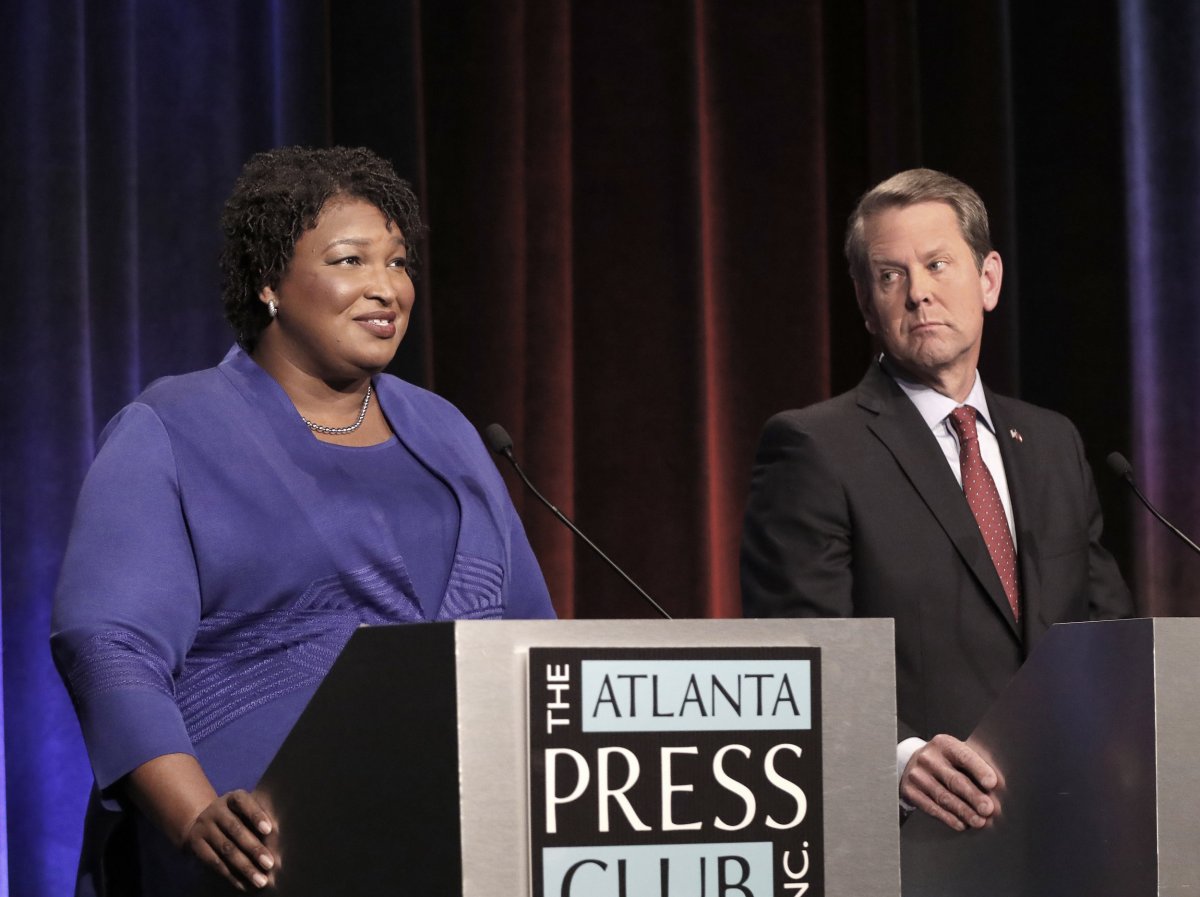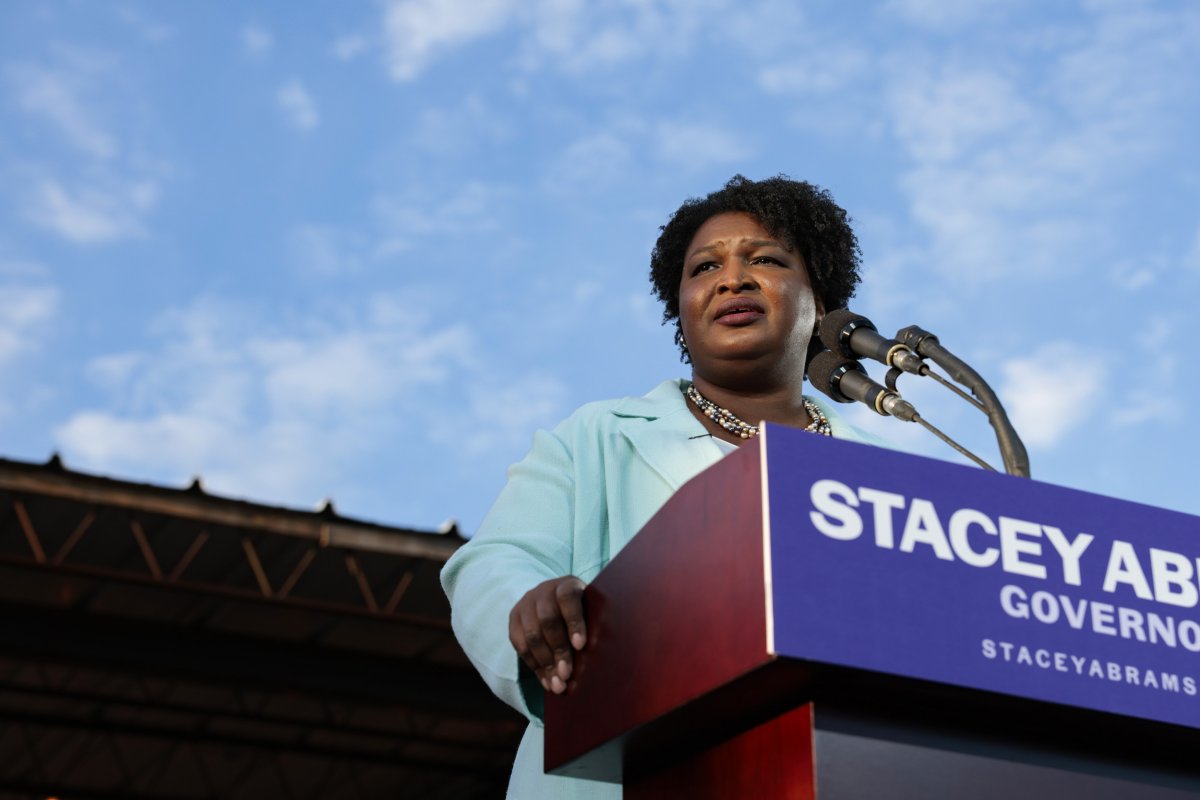Georgia Governor Brian Kemp's victory in Tuesday's GOP primary may have dealt a blow to some of his Republican critics, but his win is also bad news for his Democratic gubernatorial opponent, Stacey Abrams.
Kemp and Abrams both won their party's nominations this week, with Kemp beating out former Senator David Perdue—who was endorsed by Kemp critic Donald Trump—with more than 72 percent of the GOP vote at the time the vote was called by the Associated Press. Abrams ran unopposed.
November's general election will not be the first time Kemp and Abrams face each other on the ballot. They were opponents in 2018, with Kemp defeating Abrams 50.2 to 48.8 percent.
Abrams, a voting rights activist who has been credited with the Democrats' Georgia victory in the 2020 presidential race, is known for boosting voter turnout in the state—especially among Black voters. But experts say she'll need to double those efforts now that Kemp has won the Republican primary.
Charles Bullock, a political science professor at the University of Georgia, told Newsweek that although Abrams' efforts flipped the state blue in the last presidential election, the gubernatorial race will be an entirely different situation with Kemp on the ballot.
In 2020, Biden carried the state with a narrow 0.23-point lead over Trump. Then, in January 2021, Senators Jon Ossoff and Raphael Warnock flipped both of Georgia's Senate seats blue after they defeated their Republican opponents, who were both incumbents endorsed by Trump.

Bullock said that some of the ballots cast for Ossoff and Warnock had less to do with support for the Democratic Party and more to do with opposition to the former president.
With Kemp running against Abrams again, Georgia voters who previously went blue because of Trump could still take a hit at the former president while voting for the GOP candidate this time.
"Some of the educated whites who voted for Biden, who voted for Ossoff and Warnock, because they didn't like Trump might not feel the need to vote for Democrats if it's not a situation whereby the Republican nominee that they're supporting is someone who Trump has endorsed," Bullock said.
"[Abrams] is going to have to not only mobilize a strong turnout of the minority community, but she has to get that share of the white voters," he said. Also, for a Democrat to win in Georgia, he or she must get roughly 40 percent of the college-educated vote in the state, he pointed out.
Republican strategist Jay Townsend agreed that Kemp's win will "make [Abrams'] race tougher."
"Kemp is a seasoned and savvy campaigner. If he is easily renominated, Abrams will face an uphill battle," Townsend told Newsweek before Tuesday's primary. "Always expect the unexpected, but it is safe to say the race will be nasty and hard-hitting."
Abrams faces a unique challenge because of Kemp's allure—something that Bullock said played out just last year when political newcomer Glenn Youngkin won his gubernatorial race in Virginia against former Democratic Governor Terry McAullife.
"[Abrams] would do better running against Perdue because what Kemp is going to be able to do, potentially, is to have the same kind of appeal that Glenn Youngkin had in Virginia," Bullock said. "Perdue would not be able to pull that off. He was too much in Trump's pocket."

While running against Kemp may make Abrams' path to the governorship more difficult, the GOP has its own challenges. Because a sizable share of Republican voters believe the 2020 presidential election was stolen, the lack of trust in the election process may deter them from casting a ballot, which could give Democrats some leverage in the tough race.
Republican voting reluctance could also be furthered by Trump—who still holds major influence over some GOP voters—if he blasts the state's election process over his candidate's loss in the primary. Before that race, the former president even said that Georgia "might be better" with Abrams leading the state instead of Kemp.
"You can make the case that the reason the two Democrats won in January of 2021 was because Trump and his associates, people like Sidney Powell, went around saying that you can't trust the election system. Sidney Powell was literally saying 'don't vote for those Republican senators' because they hadn't done enough to help Trump," Bullock said.
"A share of the Republican electorate still says they don't trust the election system even after the new audit was done in 2021, so it wouldn't take much for Trump to fan those suspicions and reduce the turnout potentially," he added.
Uncommon Knowledge
Newsweek is committed to challenging conventional wisdom and finding connections in the search for common ground.
Newsweek is committed to challenging conventional wisdom and finding connections in the search for common ground.
About the writer
Katherine Fung is a Newsweek reporter based in New York City. Her focus is reporting on U.S. and world politics. ... Read more
To read how Newsweek uses AI as a newsroom tool, Click here.








